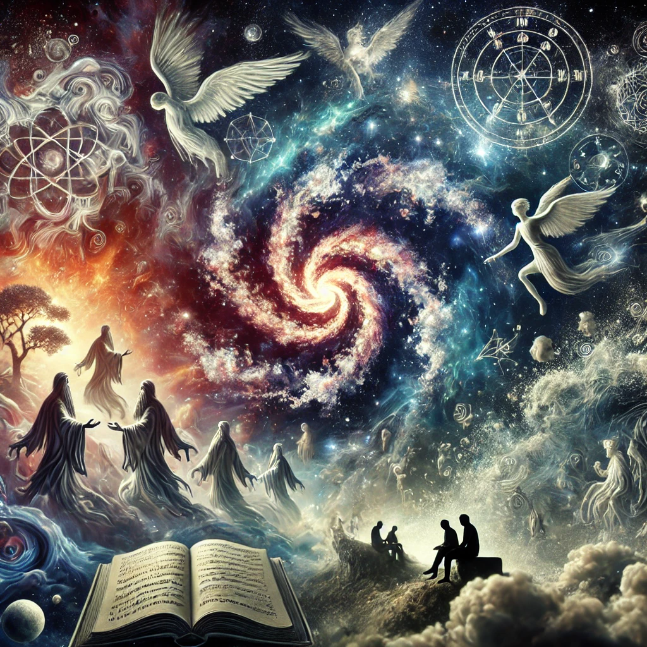Ancient Myths and Legends: Unveiling the Mysteries of Our Past
-
Richard Pen
| Monday 8th of July 2024 03:21:08 PM (UTC)

Ancient myths and legends form the cornerstone of our cultural heritage, offering a window into the beliefs, values, and imaginations of our ancestors. These timeless tales have been passed down through generations, transcending time and geography, and continue to captivate us with their rich narratives and profound insights. In this article, we will delve into the world of ancient myths and legends, exploring their origins, significance, and enduring impact on contemporary culture.
The Birth of Myths: Origins and Purpose
Myths and legends originate from the earliest days of human civilization, serving as a means to explain the unknown and make sense of the world. In the absence of scientific knowledge, ancient people relied on stories to interpret natural phenomena, human behavior, and the cosmos. These tales were not mere flights of fancy; they were integral to the social, religious, and cultural fabric of early societies.
Myths often feature gods, goddesses, and supernatural beings who wield immense power and influence over the world. These divine characters embody the forces of nature, human emotions, and moral values. Legends, on the other hand, typically revolve around heroic figures whose extraordinary deeds and adventures serve as moral exemplars and cultural icons.
Ancient Civilizations and Their Mythologies
Mesopotamian Mythology
Mesopotamia, often referred to as the cradle of civilization, is home to some of the earliest known myths. The Epic of Gilgamesh, one of the oldest surviving literary works, tells the story of the eponymous hero's quest for immortality. This epic explores themes of friendship, mortality, and the human condition, reflecting the values and beliefs of ancient Sumerian society.
Egyptian Mythology
The mythology of ancient Egypt is replete with gods and goddesses who personify natural and cosmic forces. The story of Osiris, Isis, and Horus is one of the most significant myths, detailing the cycle of life, death, and rebirth. The pharaohs were believed to be descendants of the gods, and these myths reinforced the divine right to rule and the eternal nature of the soul.
Greek Mythology
Greek mythology is perhaps the most well-known and extensively studied of all ancient mythologies. The pantheon of Greek gods and goddesses, including Zeus, Hera, Athena, and Apollo, played central roles in the lives of the ancient Greeks. Myths such as the Iliad and the Odyssey, attributed to Homer, explore themes of heroism, fate, and the human struggle against the divine.
Roman Mythology
Roman mythology borrowed heavily from Greek traditions, adapting and reinterpreting them to suit Roman culture and values. The story of Romulus and Remus, the legendary founders of Rome, highlights themes of conflict, sacrifice, and the divine origins of the city. Roman myths also emphasized the importance of duty, honor, and loyalty to the state.
Norse Mythology
Norse mythology, with its pantheon of gods such as Odin, Thor, and Loki, reflects the harsh and rugged environment of the Viking world. The tales of Ragnarok, the end of the world, and the heroic exploits of the gods and warriors capture the Norse spirit of bravery, resilience, and acceptance of fate. These myths were preserved in the Eddas and Sagas, which continue to inspire modern literature and media.
The Functions of Myths and Legends
Myths and legends serve multiple functions within ancient societies:
Explaining the Unknown
Myths provided explanations for natural phenomena, such as the changing seasons, storms, and celestial events. They offered a framework for understanding the mysteries of the universe and humanity's place within it.
Cultural Identity and Social Cohesion
Myths reinforced cultural identity and social cohesion by promoting shared values, beliefs, and traditions. They were often used to justify social structures, political systems, and religious practices.
Moral and Ethical Guidance
Legends, in particular, served as moral and ethical guides, illustrating the consequences of virtuous and immoral behavior. Heroes and gods were portrayed as role models, embodying the virtues and vices that defined the cultural ideals of their societies.
Ritual and Religious Practice
Myths were integral to religious rituals and ceremonies, providing a narrative context for worship and offering. They helped to structure the religious calendar, dictate the conduct of rituals, and explain the origins of sacred practices.
The Enduring Legacy of Ancient Myths and Legends
The influence of ancient myths and legends extends far beyond their original contexts. They have inspired countless works of literature, art, music, and film, continuing to captivate and resonate with audiences around the world. Modern adaptations and reinterpretations of these ancient tales reflect contemporary values and concerns while preserving the timeless essence of the original stories.
Literature and Art
Ancient myths have been a rich source of inspiration for writers and artists throughout history. From the Renaissance masterpieces of Michelangelo and Botticelli to the epic poems of Milton and Dante, these stories have been reimagined and immortalized in various artistic forms.
Popular Culture
In contemporary popular culture, ancient myths and legends continue to thrive in books, movies, television series, and video games. Works such as J.R.R. Tolkien's The Lord of the Rings, Rick Riordan's Percy Jackson series, and Marvel's Thor franchise draw heavily on mythological themes and characters.
Psychology and Philosophy
The study of myths has also influenced fields such as psychology and philosophy. Carl Jung's theory of archetypes and Joseph Campbell's monomyth, or hero's journey, highlight the universal patterns and themes that underpin mythological narratives, offering insights into the human psyche and the nature of storytelling.
Conclusion
Ancient myths and legends are more than just stories; they are windows into the soul of humanity. They reveal our deepest fears, hopes, and aspirations, providing a timeless connection to our ancestors and a source of inspiration for future generations. At TxtTale.com, we celebrate the enduring power of these ancient tales, inviting you to explore their rich heritage and discover the wisdom and wonder they continue to offer.
Start the conversation
Become a member of TxtTale to start commenting.
Already a member?
